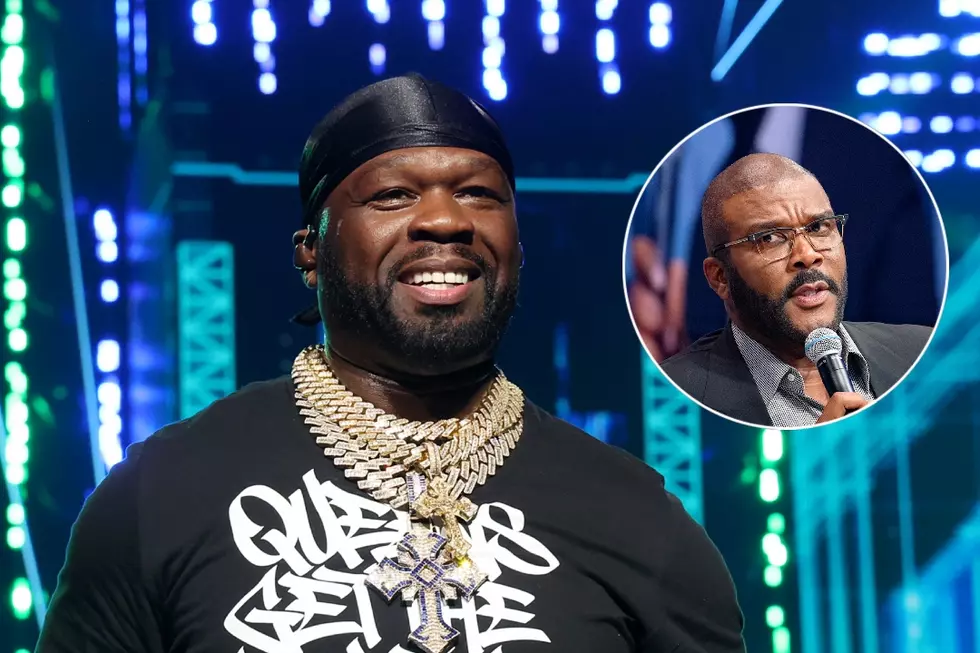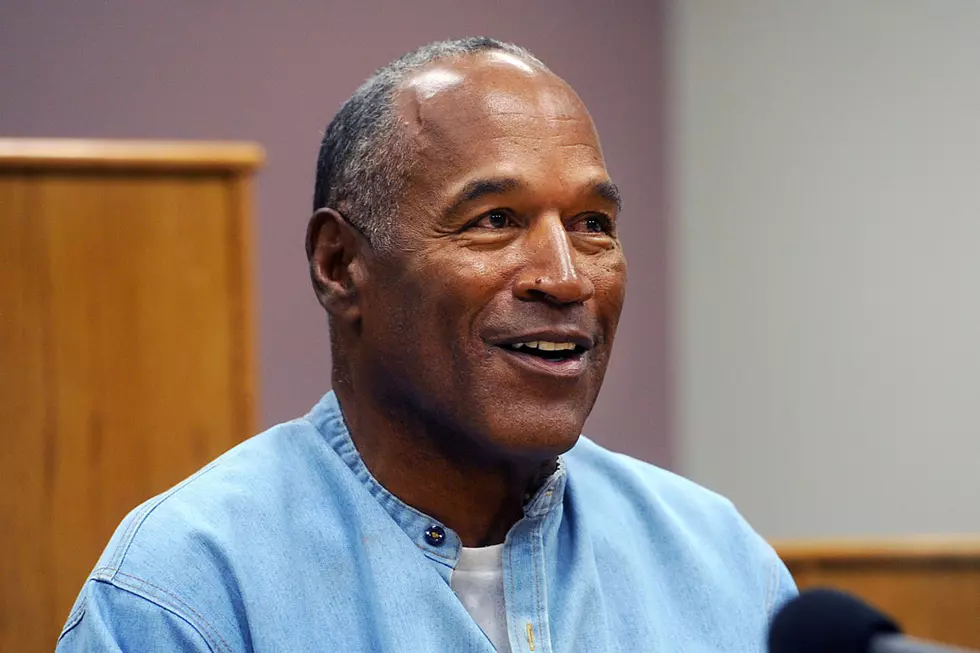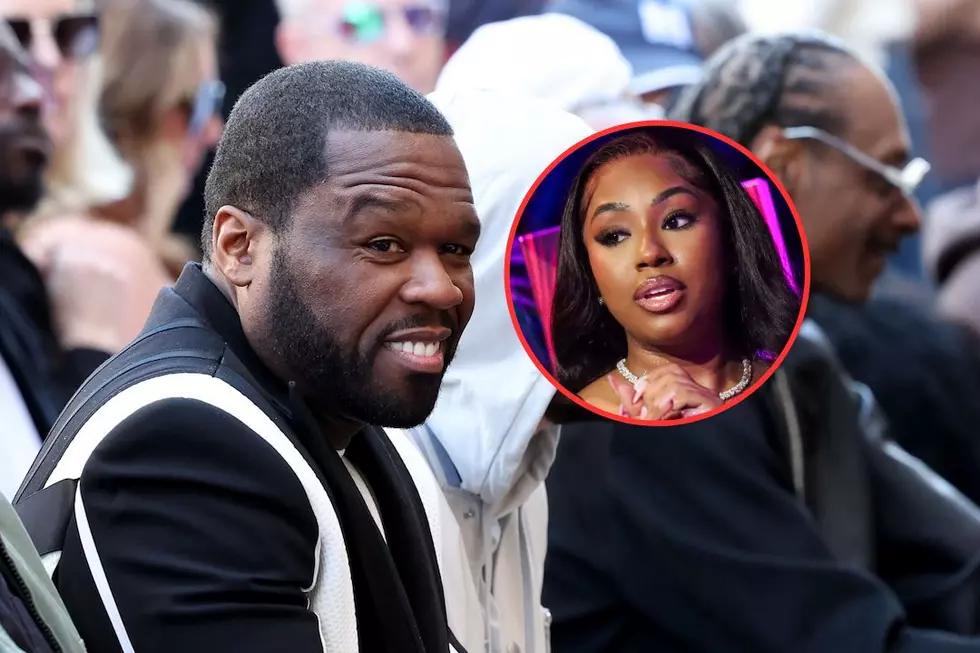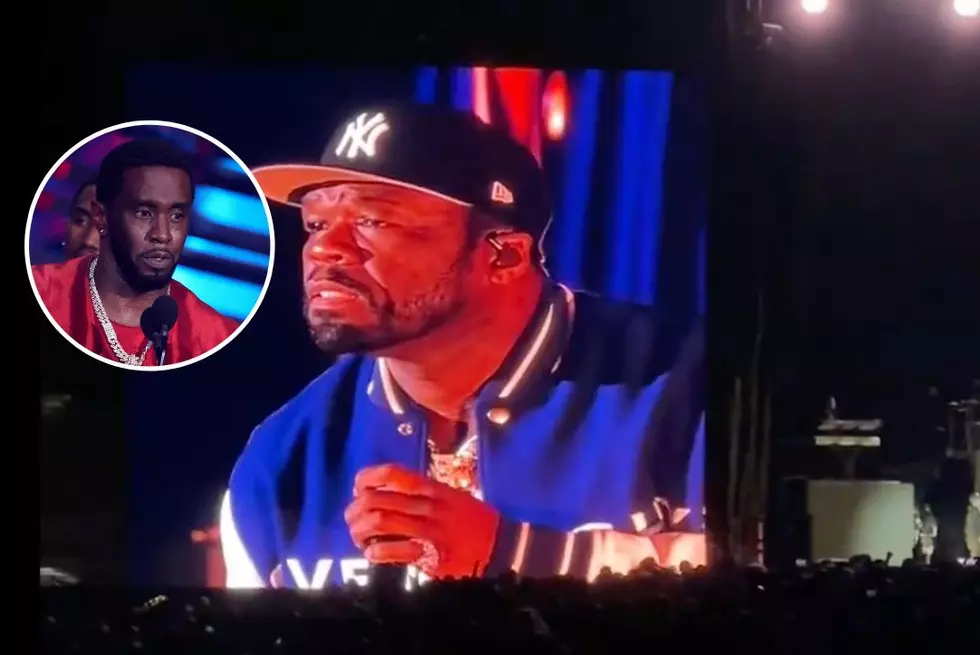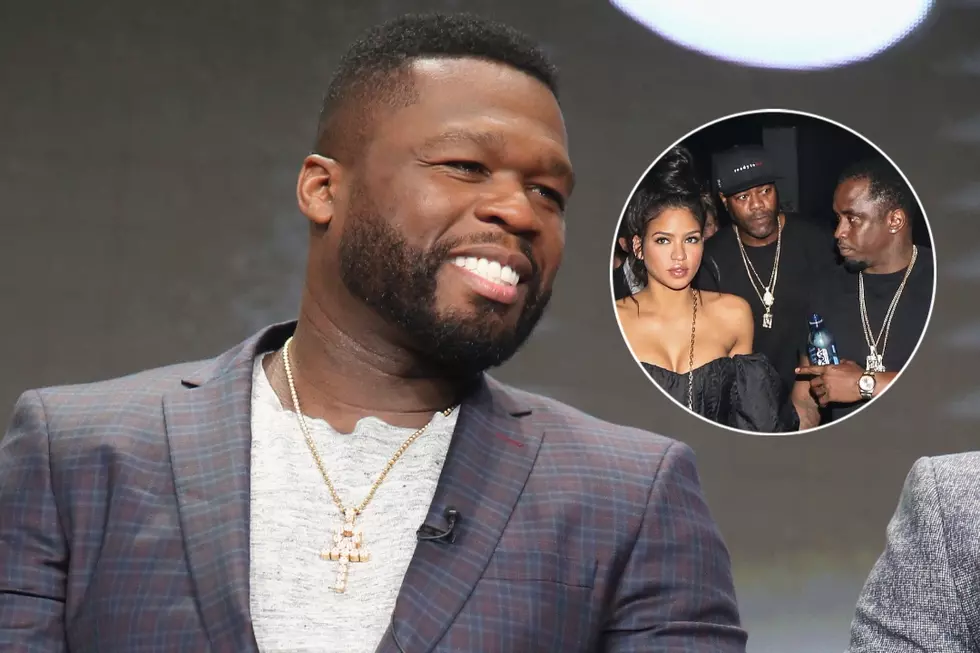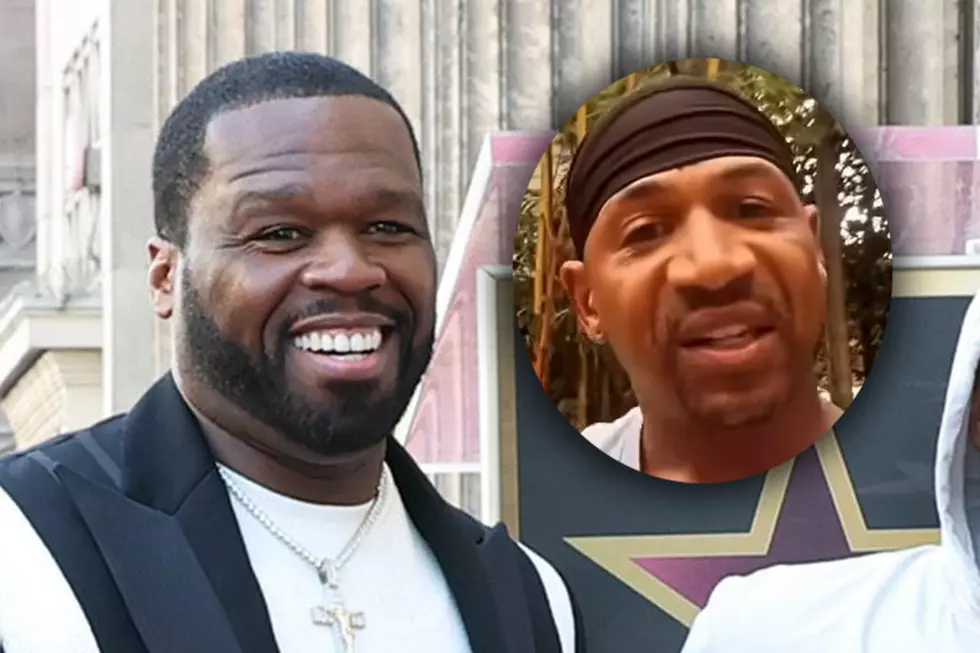
50 Cent, “War Games” (Originally Published December/January 2010)
What is a hypercompetitive, notoriously aggressive, salesobsessed rap megastar supposed to do when the industry he once dominated withers around him? Will 50 CENT self-destruct? Or can he change with the times? This is him.
INTERVIEW MATT BARONE
IMAGES CLAY PATRICK MCBRIDE
50 Cent has just discovered his next big thing. The multimillionaire MC/mogul is commanding attention inside Manhattan’s Drive- In studio, where he’s shooting cover images for this double issue, gearing up for the release of his fourth album, Before I Self Destruct. At the moment, though, he’s more interested in the laptop on the table than any flashing lights. He’s just been put on to tinychat.com, a social-networking site composed of webcam-compatible chat rooms, and he’s enthralled. The computer screen resembles a modern-day spin on The Brady Bunch’s tic-tac-toe-box opening credits—but instead of Marcia, Peter, Cindy, et al., the heads of folks like Flipmode hype man Spliff Starr, former NFL heavyweight Warren Sapp and VH1 reality star “It” (of I Love New York 2 and I Love Money 2) talk back and forth in real time.
You can practically see the little lightbulb pop up over 50’s head. His own social-networking Web site, thisis50.com, needs to adopt TinyChat. “[What] if you could have several different rooms?” he says. “You could have a bunch of different rooms with 18 people, and the user could then switch rooms.”
Curtis Jackson, 2009: computer whiz. From the corner to the monitor. And who can blame him? The record industry that was once strong enough to push his 2003 debut, Get Rich or Die Tryin’, to seven million in nation-wide sales has succumbed to the Internet. Numbers like that simply don’t exist anymore. Ever the survivalist, Fif has made ThisIs50, which he launched two years ago, a major priority. The site has become the one-stop shop for all new G-Unit music, including mixtapes from the now Interscope-free Lloyd Banks and Tony Yayo, and, more notably, Fif’s own free, Web-only mixtapes Forever King and War Angel, which has been downloaded more than 400,000 times since its June release. It also provides a handy platform for multimedia mockery of enemies like Rick Ross, Fat Joe and former G-Unit cronies Game and Young Buck. The most memorable example—a series of viral videos featuring a wig-wearing, activator-spraying 50 in character as the flamboyant Pimpin’ Curly. The vids climaxed on ThisIs50’s sister site boobootv.com, with Curly narrating a sex tape starring the mother of Rick Ross’s daughter. (Sun Tzu himself would have been left shaking his head in astonishment.) 50 says the site receives around 30 million unique views per month. (Official numbers for ThisIs50 are not available.) Even in this dismal economic climate, 50 is planning to expand the site’s current 10-person staff and increase original content, with the support of what he calls an “artificial economy—my pocket.”
The new direction makes sense. Along with the rest of the industry, 50’s brand has taken some big hits over the past two years. First there was the hugely hyped release-date sales showdown defeat, when 50’s third album, Curtis, debuted behind Kanye’s Graduation on the Billboard charts. (Pushing 700,000 first-week units, of course, would be cause for major celebration for just about any other artist, but for a market-dominating bully like 50, it was a loss of face.) G-Unit soldiers Tony Yayo and Lloyd Banks split ways with Interscope, and Young Buck was kicked out of the camp. Then came this past year’s worth of Before I Self Destruct delays. It was way back last October when Fif released the album’s first single, “Get Up,” along with a high-concept post-apocalyptic video. “In Da Club” it was not, unfortunately, peaking at No. 44 on the Billboard charts, before a quick disappearance. A follow-up, the Dr. Dre–produced “I Get It In,” didn’t fare much better. And when Interscope set a May street date for Eminem’s Relapse, 50 took a place on the back burner—a voluntary move, to his credit, but still one that kept fans waiting.
Most recently, 50 has learned that just as the Internet giveth, it taketh away. In late October (soon after the photo shoot with XXL), Before I Self Destruct surfaced online, a full month before its intended release. Reached by phone after the leak, 50 shrugs it off. “I’m fine with it, ’cause it leaked in its entirety, in sequence, and mixed and mastered. If they would’ve heard my record in pieces, I would’ve been disappointed.” He’s so sanguine, like it’s all par for the course. Gauging from his demeanor these days, his new album title seems about as over-the-top as another edition of Pimpin’ Curly—less an actual warning sign than a carefully thought-out strategy. In other words, even as the business changes, it’s business, big business as usual.
You’re keeping a prominent presence with ThisIs50 these days. In your eyes, how big of a priority is the Internet?
I think it’s cool. That’s where we’re headed. Instead of fi ghting it, I’m just embracing it.
Were you resistant at first?
Yeah. As far as the Internet is concerned, it’s so new that the younger kids can take better advantage. Soulja Boy is one of the guys that is more open-minded to the Web, and he’ll go there immediately. But it’s more natural for him, because he worked his way from there… I watched and learned from people like him.
What was the first thing that made you realize you had to get more in touch with the Internet?
From my perspective, what the mixtape circuit was is now a viral video… When I make material and I see it be viewed a million times, I know that I pleased a small demographic that watched it so often that there’s a million views. Or a broad demographic of people are drawn to it. I feel good either way… As [the Internet] changes and there’s new applications and new things involved with the site, I learn that right away. That makes me comfortable. I’m in a comfortable space.
I think the majority of us, well, the demographic that’s conditioned to go and do things the old-fashioned way. Like, I’m conditioned to go buy a record out the store. Even if it’s an option to buy it off the computer, I still buy it out the store, in the actual case. The kids, the new age group, the new kids are more perceptive of computers. They don’t have to have the experience of going to purchase your CD or going to see your movie.
CD sales figures certainly reflect that. What’s your barometer for success today?
I mean, it’s different. I won’t even gauge it like that. I’ll pay attention to the response of the public, how they feel about the actual record. You’ll know generally how they feel. I wanna hear it bumping out of the cars when they ride by. The magic of music is that everything feels right when it feels right, and
you can tell that you’re in pocket when that happens. They were giving me resistance—they didn’t want me to win during the Curtis project, because of the success I had prior to that. But it’s interesting, because they made me successful. And when I say “they,” I mean the general public. It’s a cycle where you can’t control it. There’ll be a point when they decide that they don’t want you to be the center of attention anymore and they want somebody else to be there, even without you losing the ability to do what it is you’ve done to get there.
How do you see things moving in hip-hop musically? Do you sense a shift back toward the streets, with an artist like Gucci Mane breaking through?
We’re gonna get people from different walks of life, and that’s because the art form is expanding. Like, you got a Gucci Mane at the same time you’re getting a Drake. And he’s obviously a rich kid who ain’t been exposed to…what? That’s Drake’s part. And then you got Gucci Mane, who’s from the South, and he’s been exposed to it all. We have Little Jeezy… It’s cool to see people actually have their own identity. The same thing that they would be upset with me for is what they accept from Drake. The Kid Cudis, too. Wale. These people are necessary. They were there when I fell in love with hip-hop, but they were Q-Tip, they were Andre 3000.
You’ve been working on Before I Self Destruct for a long time. How has the tone of the album changed over the last year?
Well, the album is darker. It began darker, because I wrote the prequel to Get Rich or Die Tryin’. This album is the things that I missed that happened before. Get Rich or Die Tryin’ is really me writing my environment and my experiences in a nutshell, and it was a shorter time period. On this one, I went further back. To give you an example: When I did “Hate It or Love It,” I said, “Coming up, I was confused, my mama kissin’ a girl/Confusion and cursed, coming up in the cold world.” And my mom passed when I was eight. So that’s me reflecting on myself when I was maybe seven years old. So, for that fact, to write those pieces of my actual life and the things that wouldn’t be the coolest thing to say from a rapper’s perspective… Rappers kind of create these superheroes. They create these guys who have all the finances and the beautiful women, the nicest cars, the best jewelry. And when the director says “cut,” they go home. You know? And that’s just the reality of it. But for me, I wrote imperfections on this album, because I’m in a secure enough space to do that.
Was that hard to do?
Well, you gotta make it to a certain point in your career. Some artists never choose to do it. They stay in the safe space because they feel like another artist may use it to be competitive at some point, try to use the personal things they put out. Mine’s will only give people reasoning for my behavior. They’ll listen to this record and start to understand more. The mainstream audience really first met you through “In Da Club,” which essentially means that they didn’t see the struggle beforehand. They only know you as a megastar.
They understood the struggle. At that point, it was impossible for anybody to be harder than 50 Cent. Because these artists had made their hit songs with the intention of reaching the masses. And then I took those same songs and made them for just my neighborhood. So when I do a CD that’s aimed at my core, I get a hell of a response. Like, War Angel. You don’t get nobody to say anything negative about that project. They go, “I’ve been waiting for that!” And then the artists you have out here now who are generating interest, they don’t have the same ability.
You’ve seen 50 Cent before—his name was DMX. Before 50 Cent, there was X. X was there. And then it got lighthearted, after X came. It was Ja. It was Nelly. And Nelly was saying some aggressive shit on them records, but they wasn’t hearing that, because the melody was so soft. “They goin’ down, down baby!” It just made it easy to dance to. To me, Nelly’s crew reminded me so much of the Lost Boyz, and they were so much fun because they didn’t really feel threatening, even when Nelly was saying, “Boom, boom, with the street sweeper, ready to let it go.” I’m listening to the words, and I’m thinking, He just said some shit on them records, but the melody made it feel safe.
You refer to “aggressive content” a lot. Is it hard to keep that accessible but still keep it real?
Well, it’s harder to balance it. Kanye can make a straight pop record because he doesn’t embody aggression. There’s not an aggressive bone in his body. So he can go and just work his pop record at Top 40 radio and have a huge audience. He can start with his hit. I gotta deliver “I Get Money” before I deliver “Ayo Technology.” So my core is like, “Yo, you heard the new 50 shit? That shit’s hot.” Because, if I deliver the straight pop record first, they’re gonna go, “What the fuck is this?"
The album’s title, Before I Self Destruct, has been public for so long, since before your last album came out. You’ve really stuck with that concept for a long time. Why?
It’s about success, in general, from an artist’s perspective. The general public will offer you success by supporting you and purchasing your material, and then grow angry with you for not bearing the same pressures that they bear. By you having the comfortability and stability of the finances. Because you’re different. I mean, your clothes never really look bad, if your style is in check. Everything is there. Your presentation is pretty sharp. Somebody will go, “Hey, look, you have something on your face.” So you don’t look crazy at any point. I think they begin to want to see your imperfections or see you under confusion, which would be the most vulnerable state for an artist. And then, if something goes wrong, it’s the greatest show on earth for them. It’s like that point when Em is getting really high. It’s the point where Britney Spears is at the turmoil point, where she’s shaving her head. That is the greatest show. That’s why it has so much coverage. They want to see the artist fall apart, after they’ve built up.
What is self-destruction to you, then?
Self-destruction to me is the presentation that I can offer, instead of you having to actually watch me fall apart. See, I refuse to do that part. I’ll just go away. You understand? I won’t offer that.
So when you say, “Before I self-destruct,” are you implying that you’re sort of on the verge of falling apart yourself? Is that danger always there?
It’s always there. There’s a shadow of doubt cast over you in between each project anyway, regardless of how good you are. What’s he coming with? Every time. Let’s see what he got. They kind of influence each other now. You see the blog. One person say that they don’t like it. You can tell what’s good or not by the majority rule. If the majority of them is saying that 50’s music is good, then you know the shit is right. If you got everybody on the shit saying, “This sucks,” then it sucks. You can look at the comments pages and see where you at.
The thing is, for an artist who’s always been so confident and dominant, to imply that he’s vulnerable, in the sense of self-destruction, it’s pretty jarring.
Yeah, it is. I think, when you have leadership qualities, you absolutely want to be in the lead. But it won’t prevent you from having that point when you feel used. People become comfortable with you being in the actual lead position and become complacent. Not do what they have to do, because they figure, You got it, you’ll do it for me. And that’s an interesting feeling. And I’ve had to feel that often. A lot of the artists that I’ve committed to in the past, it’s obvious that—even when you think a person is great, they make mistakes. I pride myself on trying to be a good judge of character, and obviously I’ve made mistakes.
You’re talking about Game and Young Buck?
You see the artists that I’ve supported that have completely turned in an effort to crawl into a higher slot. It’s just hip-hop in general. They feel like they can’t actually be the boss under someone else. They have to fight the situation that created them, because I’m still visible. See, it’s like… Em, to me, every time I make reference to him, it’s to say that he is the best rapper. ’Cause, to me, he is. I can still be a fan of Em’s material… I keep saying that he’s the best rapper. Nobody says that. Nobody says that about another artist. Nobody says that. I’m only comfortable saying that because I know he 100 percent has my best interests in mind.
He’s earned that.
Right. If he was ever to say something negative about me, it would feel like my grandmother is upset with me. Like, it would roll off my back so easy. “Ahhh, I got him mad!” Whatever I did, I know I motivated it somehow. The relationship is interesting.
Compare it to your relationship with Dr. Dre.
Dre is different. He has a whole other thing. I don’t think it’s possible to have that kind of relationship with Dre. I think Em feels the way I feel about him about Dre. This is why, if I ever have feelings toward the way me and Dre interact, you’d never hear about it, because it would be affecting Em. At different points, Dre is conscious of Dre, and just that. From an artistic standpoint, what you get from him is fuckin’ amazing. For me, I’ve had collaborations. I’ve worked with a lot of different producers and came up with really good things. But the highlight reel is still a Dr. Dre reel. Without “In Da Club,” I’m not sure “P.I.M.P.” would’ve been what it is. This is how my character is terribly different from Game or Buck or the other guy, because I view that effort—and that was in 2003. I view that effort as if it shifted things and made people hear me differently. I always credit that. And I think somehow they forgot that I did their records.
What exactly sets you apart from them?
Moral compass. Your basis of how—codes of conduct. They’re different. I think their interpretation of even “gangster” is something completely different from me. For me, a gangster is just someone who’s conscious, who consciously goes against the grain, against the structure, [someone who is conscious of the] fact he has to bear the repercussions when the times comes. So if he’s incarcerated, he doesn’t tell on anybody, because he already assessed the situation, and he’s fine with the repercussions. We got kids in my neighborhood who commit gangster acts, but they’re not actually gangsters, so they tell after the fact. And they turn into something else. There’s a lot of wet pillows in prison. They’re crying about it later.
You surprised people recently by burying the hatchet with some people you once had problems with. For instance, at the ThisIs50 Fest on Governor’s Island, you had Jadakiss there.
Well, we got specific artists who didn’t really… They didn’t do the same things that other artists did. After the fact, what were our original issues? I watch hip-hop. I watch other artists maneuver. [Jay-Z] will put somebody in front of him. Like, he had issues with Jada before, before, but he put Beanie out in front,
and Beanie went back and forth with Jada. Then he had issues with Cam’ron, and Tru Life went back and forth with him. So he brings somebody around almost for protection, so he can just not have to compete, and let somebody else do it. You can make like you’re bigger than the actual artist because of your finances. But that doesn’t help the culture. That doesn’t help the art form. The whole object is to compete and do it on a higher level… Check this out: If I ignored every artist who took a shot at me, you wouldn’t know who I am. It defi nes me. It’s character traits. It’s not in my character to let somebody get away with saying something about me. And if it’s not a response on record, I’ll start doing things that I’m not supposed to do, like getting them hurt. It’s obvious that these guys are just rappers, so I’d be fuckin’ up the whole game—the whole business, then, at that point. Then it’ll turn into where it’s mandatory that you respond on the street. It’s not no you make music and see what happens.
You walked in here today pretty much by yourself, no security.
Yeah. It’s the same thing. It’s necessary for them to walk in with 20 people because they’ve made promises. They’ve promised people things, and there’s a sense of security having that many people around. [Long pause] I feel like the president sometimes. Not because he’s Black, but because he’s Obama. See, you can get close enough to the president to kill him, because he has to walk around and kiss babies. But you won’t get away with it. So you have to assess not getting away with it before you do that. And they have to really think about it, because you’re not gonna get away with it against me. There ain’t gonna be no, “You’re pardoned,” or “We can have a peace treaty.” If it gets past us actually rapping, then it’ll never end.
More From XXL


